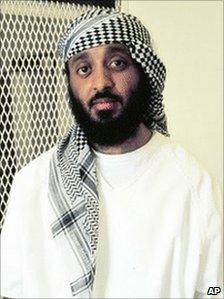Tapes show interrogation of 9/11 suspect Binalshibh, US says
- Published

US officials have confirmed the existence of videotapes of the 2002 interrogation of an alleged 9/11 plotter, reportedly at a secret prison.
The tapes, which the Associated Press said were found under a CIA desk, are said to show Ramzi Binalshibh at a Moroccan-run jail once used by the CIA.
But a US official downplayed their significance, saying they "show a guy sitting at a desk answering questions".
They are said to be the only recordings from a defunct CIA secret jail network.
The US government has said the CIA destroyed 92 videotapes of interrogations of terror suspects, but the Associated Press reported two videotapes and an audiotape were discovered under a desk in 2007 at an agency office.
A CIA spokesman declined to answer questions about the tapes, but said the agency's "past detention programme has been subject to multiple reviews by multiple government organisations under two administrations".
'Protecting Americans'
"Some of those examinations continue to this day, a year and a half after the programme itself went out of operation.
"The so-called black sites and enhanced interrogation methods, which were administered on the basis of guidance from the Department of Justice, are a thing of the past," he said.
"While we continue to co-operate with inquiries into past counter-terrorism practices, the CIA's focus now is exactly where it should be: protecting the American people now and into the future," he told the BBC.
Meanwhile, a senior US official told the BBC: "The tapes, which were made and found years ago, show a guy sitting at a desk answering questions. That's it, and nothing more."
Mr Binalshibh - a Yemeni national - was named among the most wanted suspects within weeks of the 11 September 2001 attacks on the US and is now set to face charges brought by the Pentagon over the attacks.
He is currently being held at the US detention centre at Guantanamo Bay, Cuba.
'Black sites'
Some say the tapes could be used to illustrate Mr Binalshibh's mental state and his fitness to stand trial on terrorism charges.
"If those tapes exist, they would be extremely relevant," Thomas Durkin, Mr Binalshibh's civilian lawyer, told the Associated Press.
In April 2009 the CIA said it had closed its network of "black sites" - secret prisons the Bush administration allowed it to operate on the territory of allied countries in Eastern Europe, Asia and Africa, according to media reports.
The "black sites" were used to detain terrorism suspects, some of whom were subjected to interrogation methods described by many as torture.
- Published9 April 2009
- Published21 January 2009
- Published22 December 2009
- Published22 January 2009